|
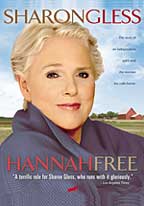
Hannah
Free
Wolfe
Video,
2009
Director:
Wendy Jo Carlton
Screenplay:
Claudia Allen
From her play
Starring:
Sharon Gless,
Maureen Gallagher,
Kelli Strickland,
Ann Hagemann,
Taylor Miller
Jacqui Jackson,
Meg Thalken
Unrated,
86 minutes
|
A
Star Turn From Sharon Gless
by
Michael D. Klemm
A shorter version also appeared on abOUTmag.com,
June, 2010
Posted online, May, 2010
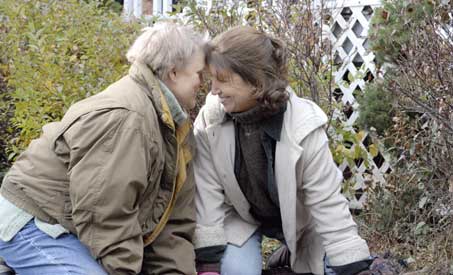
It is
a scenario that was once too familiar. An elderly gay man or lesbian lies
dying in the hospital while homophobic family members deny visitation
rights to a longtime companion. That is one of the conflicts driving the
drama in Hannah Free, a 2009
film directed by Wendy Jo Carlton. The three-hanky script by Claudia Allen
is adapted from her play. Sharon Gless (Queer
As Folk, Cagney and Lacey) delights her longtime lesbian fanbase
by finally playing a Sapphic sister on the screen. She steals the show
as a boisterous old tomboy who wants to see her lover again one more time
before she dies.
|
|
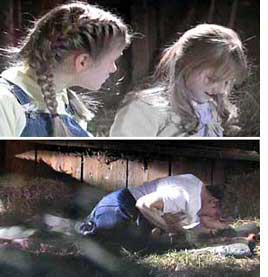 Hannah
(Gless, and Kelli Strickland as a young woman in the flashbacks) is confined
to her bed in a second rate nursing home. Her lifelong lover, Rachel (old:
Maureen Gallagher, young: Ann Hagemann), is in a coma, and on life support,
in the same hospital. Rachel's born again daughter, Marge (Taylor Miller),
has ordered the nursing staff to keep Hannah away from her mother. Throughout
the nonlinear film, scenes from their relationship are recalled in flashback.
Both grew up in a small, midwestern town. We see them as children playing
in a barn and later making love there as grown ups. Hannah became a freewheeling,
unapologetic dyke. Rachel wanted to be a housewife and got married. Widowed
early, Rachel never re-married and shacked up with her girlhood friend,
Hannah. But Hannah had a streak of wanderlust and was wont to impulsively
spend a few months in places like Alaska, Paris and Brazil; or join the
WACs during World War II. Hannah
(Gless, and Kelli Strickland as a young woman in the flashbacks) is confined
to her bed in a second rate nursing home. Her lifelong lover, Rachel (old:
Maureen Gallagher, young: Ann Hagemann), is in a coma, and on life support,
in the same hospital. Rachel's born again daughter, Marge (Taylor Miller),
has ordered the nursing staff to keep Hannah away from her mother. Throughout
the nonlinear film, scenes from their relationship are recalled in flashback.
Both grew up in a small, midwestern town. We see them as children playing
in a barn and later making love there as grown ups. Hannah became a freewheeling,
unapologetic dyke. Rachel wanted to be a housewife and got married. Widowed
early, Rachel never re-married and shacked up with her girlhood friend,
Hannah. But Hannah had a streak of wanderlust and was wont to impulsively
spend a few months in places like Alaska, Paris and Brazil; or join the
WACs during World War II.
|
|
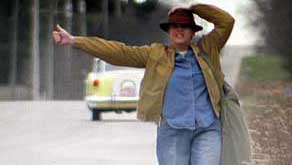 And
this is the central conflict. Hannah's absences greatly effected her partner.
Rachel wanted conventionality, Hannah sought adventure and thrived on
change. An angry Rachel was always still there when Hannah returned and
their relationship somehow survived into old age, despite a heterosexual
marriage, WWII, an affair and finally family members in denial. And
this is the central conflict. Hannah's absences greatly effected her partner.
Rachel wanted conventionality, Hannah sought adventure and thrived on
change. An angry Rachel was always still there when Hannah returned and
their relationship somehow survived into old age, despite a heterosexual
marriage, WWII, an affair and finally family members in denial.
|
|
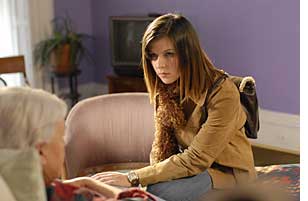 Hannah
is visited by a young lesbian named Greta (Jacqui Jackson) who wants to
interview the older woman about the Great Depression. We soon learn that
there is more to her agenda and a twist involves her lineage. Greta becomes
Hannah's knight in shining armor and offers to return at 3 a.m. and sneak
Hannah into Rachel's room. Later that night, Greta pushes Hannah's wheelchair
past oblivious nurses towards a date with destiny. Hannah
is visited by a young lesbian named Greta (Jacqui Jackson) who wants to
interview the older woman about the Great Depression. We soon learn that
there is more to her agenda and a twist involves her lineage. Greta becomes
Hannah's knight in shining armor and offers to return at 3 a.m. and sneak
Hannah into Rachel's room. Later that night, Greta pushes Hannah's wheelchair
past oblivious nurses towards a date with destiny.
|
|
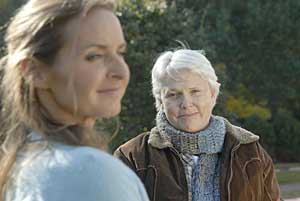 A
number of plot devices are employed to keep the film from degenerating
into complete schmaltz; some are more successful than others. The modern-day
hospital scenes are broken up by nostalgic period flashbacks that dramatize
the highs and lows of their relationship. These scenes are handsomely
done and are amongst the film's best. During the framing story, Hannah
delivers frequent monolgues as she writes in her diary and her cantankerous
thoughts add much needed comic relief. Scenes that involve a nosy woman
who delivers the mail, and another who proselytizes religion, are a bit
forced - ditto for an annoying old man who keeps forgetting where his
room is. The plot, however, is strong enough to overcome any shortcomings
in the storytelling. Hannah Free
was made with the best of intentions and, for the most part, it satisfies. A
number of plot devices are employed to keep the film from degenerating
into complete schmaltz; some are more successful than others. The modern-day
hospital scenes are broken up by nostalgic period flashbacks that dramatize
the highs and lows of their relationship. These scenes are handsomely
done and are amongst the film's best. During the framing story, Hannah
delivers frequent monolgues as she writes in her diary and her cantankerous
thoughts add much needed comic relief. Scenes that involve a nosy woman
who delivers the mail, and another who proselytizes religion, are a bit
forced - ditto for an annoying old man who keeps forgetting where his
room is. The plot, however, is strong enough to overcome any shortcomings
in the storytelling. Hannah Free
was made with the best of intentions and, for the most part, it satisfies.
|
|
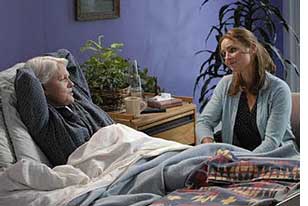 It
also gets a little weird. Hanna holds conversations with the younger Rachel.
They often bicker; Rachel teases Hannah about Greta and these scenes are
funny. These chats are undoubtedly in Hannah's mind but a line is occasionally
crossed in which it is implied that they really are speaking and
that the comatose Rachel's spirit is asking for help. The film's stage
roots are evident in these scenes and the results are mixed. Films that
attempt to retain a play's theatricality can be interesting. I've championed
a few films in the past for successfully doing so, but this one
doesn't always find the right balance. Thankfully, the director avoids
the worst cliches and Rachel's appearances are not accompanied by a ghostly
glow or ethereal music. It
also gets a little weird. Hanna holds conversations with the younger Rachel.
They often bicker; Rachel teases Hannah about Greta and these scenes are
funny. These chats are undoubtedly in Hannah's mind but a line is occasionally
crossed in which it is implied that they really are speaking and
that the comatose Rachel's spirit is asking for help. The film's stage
roots are evident in these scenes and the results are mixed. Films that
attempt to retain a play's theatricality can be interesting. I've championed
a few films in the past for successfully doing so, but this one
doesn't always find the right balance. Thankfully, the director avoids
the worst cliches and Rachel's appearances are not accompanied by a ghostly
glow or ethereal music.
|
|
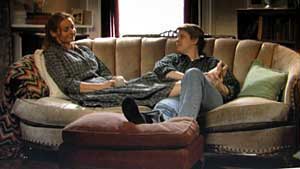 The
relationship between the two women is certainly unique. Rachel tried to
enjoy the best of both worlds; juggling church socials and baked good
sales while still living with her tomboy girlfriend. "You always
thought we were the only girls that did what we did," Hannah tells
Rachel. She also chides Rachel for marrying the dullest man she could
find in an effort to escape her father's temper. "You tried to mourn
him," Hannah observes, "But it was always me you wanted
to cook for." Rachel does love Hannah but she also has her
limits. She is less than thrilled when a Brazilian missionary follows
Hannah home from one of her jaunts, and her anger knows no bounds when
Hannah - at this point in her 60s - expresses a desire to visit the Himalayas. The
relationship between the two women is certainly unique. Rachel tried to
enjoy the best of both worlds; juggling church socials and baked good
sales while still living with her tomboy girlfriend. "You always
thought we were the only girls that did what we did," Hannah tells
Rachel. She also chides Rachel for marrying the dullest man she could
find in an effort to escape her father's temper. "You tried to mourn
him," Hannah observes, "But it was always me you wanted
to cook for." Rachel does love Hannah but she also has her
limits. She is less than thrilled when a Brazilian missionary follows
Hannah home from one of her jaunts, and her anger knows no bounds when
Hannah - at this point in her 60s - expresses a desire to visit the Himalayas.
|
|
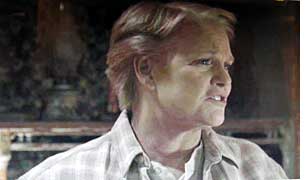 Sharon
Gless is outstanding in the role and runs with it to the finish line.
She will surely remind some viewers of Debbie Novotny on Queer As Folk
but that isn't a bad thing. Gless does crotchety well but she can also
break your heart with a gesture or facial expression, or just the slightest
change in vocal inflection. She can be a remarkably subtle actress and
then channel Ruth Gordon a minute later and yet make it all utterly believable.
As a vehicle for Gless, Hannah Free
soars. I have to be honest; there are more than a few clunky lines of
dialogue but Gless knows how to bring them off. The acting by each of
the actresses playing Hannah and Rachel is superb, the others are a mixed
bag (some are cartoons). Sharon
Gless is outstanding in the role and runs with it to the finish line.
She will surely remind some viewers of Debbie Novotny on Queer As Folk
but that isn't a bad thing. Gless does crotchety well but she can also
break your heart with a gesture or facial expression, or just the slightest
change in vocal inflection. She can be a remarkably subtle actress and
then channel Ruth Gordon a minute later and yet make it all utterly believable.
As a vehicle for Gless, Hannah Free
soars. I have to be honest; there are more than a few clunky lines of
dialogue but Gless knows how to bring them off. The acting by each of
the actresses playing Hannah and Rachel is superb, the others are a mixed
bag (some are cartoons).
|
|
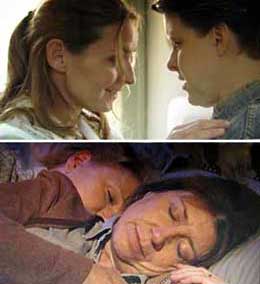 There
is great chemistry between each of the Hannah-Rachel pairings. Their love
scenes are amongst the most beautiful between two women ever filmed. One
of the nicest moments is one where both are old and lay cuddled together
in bed; something that is rarely seen in the movies. The film's delights,
and there are many, outnumber the parts that are stilted. A sudden third
act shift doesn't entirely work but the film's final shot is as haunting
as they come. Gless adds gravitas to a film that, while flawed, still
resonates with raw emotions. Hannah Free
was a hit on the festival circuit and should prove succssful on DVD. There
is great chemistry between each of the Hannah-Rachel pairings. Their love
scenes are amongst the most beautiful between two women ever filmed. One
of the nicest moments is one where both are old and lay cuddled together
in bed; something that is rarely seen in the movies. The film's delights,
and there are many, outnumber the parts that are stilted. A sudden third
act shift doesn't entirely work but the film's final shot is as haunting
as they come. Gless adds gravitas to a film that, while flawed, still
resonates with raw emotions. Hannah Free
was a hit on the festival circuit and should prove succssful on DVD.
Sharon
Glass also appears in:
Queer As Folk
|

